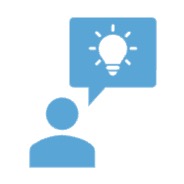Operational Excellence Overview
Operational Excellence applies a holistic lens to solving campus-wide challenges and advancing opportunities to improve administrative and operational functions supporting the University’s mission. Operating in three buckets, Operational Excellence plans and executes executive level projects, transforms administrative operations, and develops continuous improvement competencies campus-wide.

When schools and units reach out to Operational Excellence to collaborate on an opportunity for operational improvement, the OE team undertakes a series of discovery meetings to learn more about the challenges faced and the ideal outcome. During this phase, OE may suggest training, advising or facilitation as approaches to move the problem towards a solution. In the case of a larger, more complex challenge, OE will continue to work with the campus partners on a project charter that scopes the problem, the importance of solving it and how to measure success. OE may then continue to lead the charge by utilizing the solution design and/or transformation and change management approach. + Output: The process ends with a project charter: a formal document that outlines the project’s purpose, objectives, key stakeholders, scope, timeline, budget and metrics. The charter is used to set clear expectations and objectives for all stakeholders, preventing the project from expanding beyond its scope and ensuring its results are measurable. + Solution Design typically begins with design team workshops, followed by a pilot or soft-launch. The Design Team approach relies on continuous stakeholder engagement throughout the process. +Weekly Design Team workshops during the solution design phase + Output: To be defined on a per engagement basis. Examples include coaching for critical meetings or workshops, problem solving on operational challenges and other opportunities for guidance and/or feedback. to successfully achieve predetermined objectives. + Output: 1-2 structured conversations and workshops led by the OE Transformation Manager tailored to the needs of the school/unit.
 Project definition sets the stage for effective and successful project management. In the project definition phase, OE researches the problem from every angle through interviews and data analysis, then defines a project to address the problem head-on.
Project definition sets the stage for effective and successful project management. In the project definition phase, OE researches the problem from every angle through interviews and data analysis, then defines a project to address the problem head-on.
 OE facilitates structured solution design for complex challenges by bringing together diverse perspectives from across campus to evaluate a problem, design a solution, and plan for implementation.
OE facilitates structured solution design for complex challenges by bringing together diverse perspectives from across campus to evaluate a problem, design a solution, and plan for implementation.
+Weekly meetings between the OE Transformation Manager and Functional Lead
+Weekly leadership touchpoint meetings with OE Leadership and executive sponsors
 We take this approach when units with an identified project or initiative that needs dedicated support for initiating and implementing a change in the fundamental strategy and operational practices of the organization. Often, these project requests originate from the Office of the Chancellor or the Provost. Operational Excellence leads the project or initiative beyond typical administrative support associated with project management by ensuring adoption.
We take this approach when units with an identified project or initiative that needs dedicated support for initiating and implementing a change in the fundamental strategy and operational practices of the organization. Often, these project requests originate from the Office of the Chancellor or the Provost. Operational Excellence leads the project or initiative beyond typical administrative support associated with project management by ensuring adoption.
 Provide advising, coaching, and thought partnership without directly facilitating sessions. Applicable for any dimension of operational improvement.
Provide advising, coaching, and thought partnership without directly facilitating sessions. Applicable for any dimension of operational improvement.
 Design and facilitate a session with an existing team
Design and facilitate a session with an existing team
![]()
These guidelines serve as the foundation for how the Operational Excellence team approaches opportunities for operational improvement.



